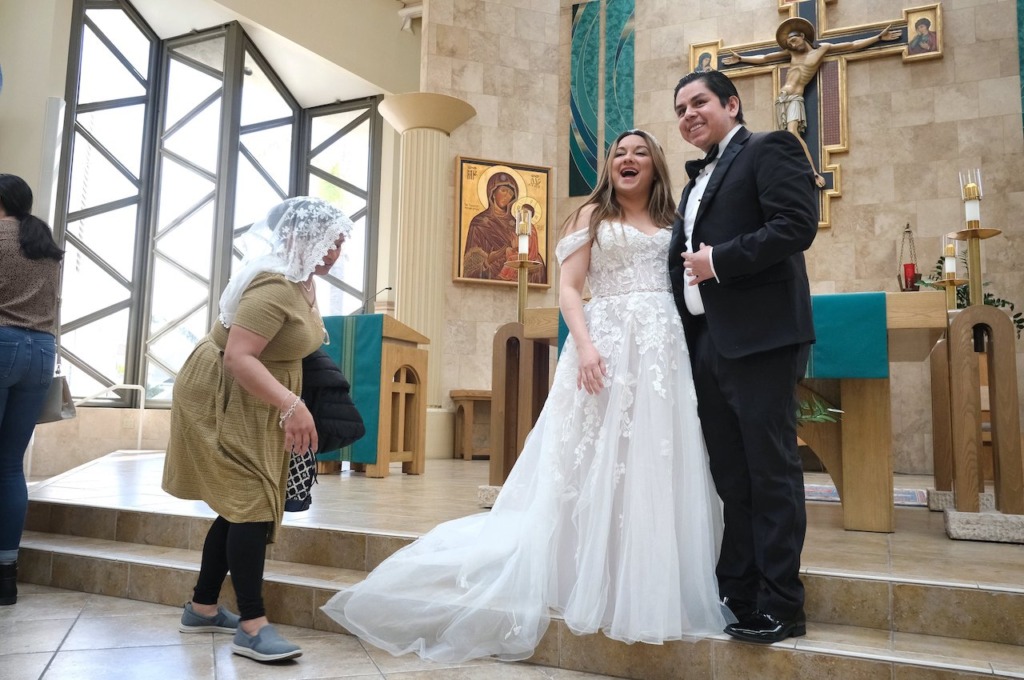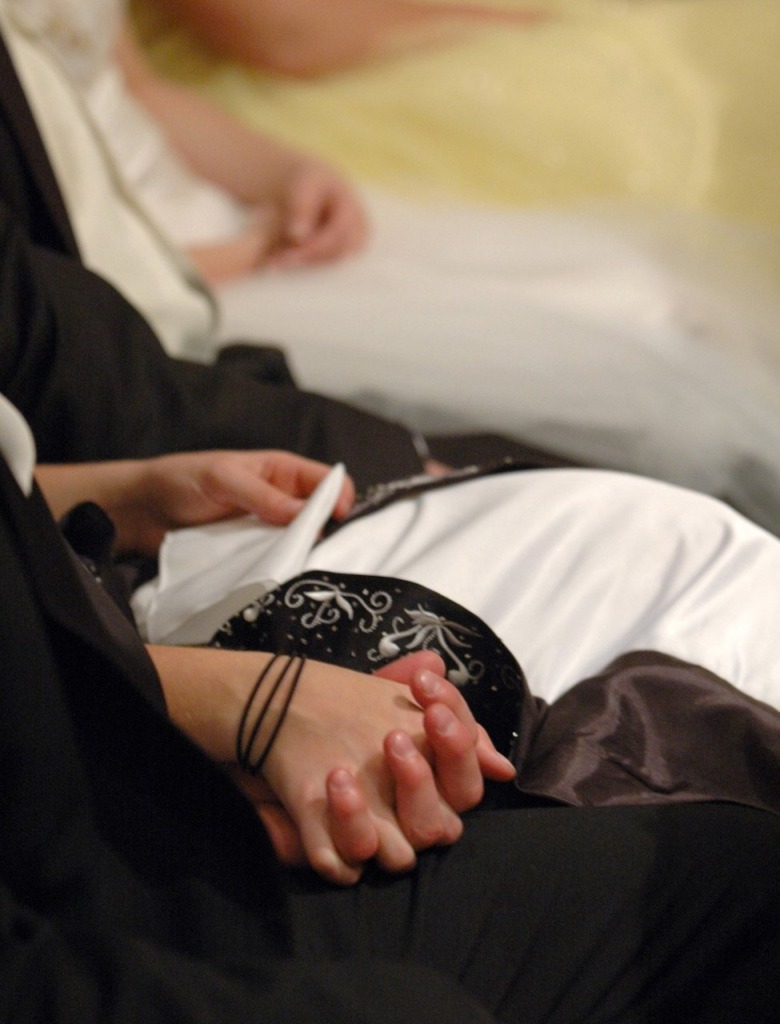(OSV News) – Among Catholics, the sacrament of matrimony is in freefall. Over 50 years between 1969 and 2019, Catholic marriages declined 69% even as the Catholic population increased by nearly 20 million, according to Georgetown University’s Center for Applied Research in the Apostolate.
In 2021, as U.S. Catholics largely emerged from the restrictions of the COVID-19 pandemic, weddings were still down more than 30,000 from 2019’s pre-pandemic number of nearly 132,000 marriages celebrated.
However, fueling the decline is a broader cultural crisis of dating that is also leaving single Catholics struggling to meet each other in person, or even online.
A 2021 survey by the Institute for Family Studies asked people under 55 who desired marriage why they were not married: 58% said, “It is hard to find the right person to marry.”
When Roxane, 23, logged onto CatholicMatch, she found very few matches near her home in Maryland. To broaden her scope, Roxane tried the dating app Hinge, and found two men who claimed to be Catholic, “but sitting in church for one hour a week was too much for them,” she told OSV News.
Some in her situation form long-distance relationships; the CatholicMatch Instagram account regularly posts success stories, many about long-distance couples. But that doesn’t appeal to Roxane.
“I feel a connection more when I’m with the person physically so that I can see the expression, the body language, and how he treats other people,” she said.

Matt, 23, also struggles to meet fellow single Catholics in-person. He said the dating scene was pretty good at his Catholic university, but following graduation, it’s hard to find like-minded Catholic women.
“Most of the people I meet in Chicago aren’t interested in having a family anytime soon, let alone having a relationship or life centered around faith,” Matt told OSV News.
He also suspects that many women don’t feel the need for a man, at least until they’re older and financially established. In his experience so far, Matt said, “I’d say a lot of women wouldn’t ever put something like that above their career in this age range: early to mid 20s.”
Elizabeth, 31, established her career in her 20s, but also actively searched for a spouse.
“I didn’t think it would be that difficult since I knew a lot of women who met their husbands very young,” she told OSV News.
She tried online dating, joined a local Catholic young adult group, and told friends and family she was open to meeting anyone they knew. She even employed a matchmaker. While Elizabeth succeeded in meeting people – Catholic and non-Catholic – nothing panned out.
“Most of the Catholic men were initially attracted to me, but lost interest when they learned that I planned to have a career,” she said. “The non-Catholics (and some of the Catholics) stopped seeing me when they realized that I wasn’t going to have sex with them (before marriage).”
She also found that most of the Catholic men she encountered were “rather uninteresting.”
“They didn’t seem to have much to talk about. There was no joking or flirting,” she said. “They tended to have few hobbies and interests, when compared to other men I tried to date.”
Other young Catholics told OSV News the Catholic young adult scene is also posing a challenge to form real connections – including problematic dynamics they do not typically find in non-Catholic peer groups.
“When you walk into an event with evangelicals, someone will say ‘hello’ to you right away, and draw you into their group conversation if they are in one,” Sara Perla, 40, told OSV News.
“I have been invited to things with Catholics in which I walk into the room, not knowing anyone but the host, and no one even looks up … and when you try to start a conversation, you hit a brick wall,” said Perla.
Jacob, a software engineer in his mid-20s, says he’s found a friend group and a few dates through a young adult program run by his archdiocese in the Midwest. But he also notices a lack of conversation skills among his peers at these events.
“Some of the men tend to steer towards intense intellectual, deep, theological discussions, which makes it harder for people who aren’t interested in that to participate. … There are a lot of people who are very political, and everyone’s got vastly different opinions,” said Jacob.
Many single Catholics say they struggle to find anyone “in the middle”: someone with genuine faith and a commitment to chastity, but without a super-strict approach to Catholicism that goes beyond Church teaching.
There’s confusion, too, about how to show interest in a potential partner, and even how dating works.
“Sometimes girls drop hints or act interested but guys completely have no idea about this, because they’re overthinking: ‘Is she dropping a hint or just being friendly?’ At the same time, guys don’t tell girls how they feel and tend to beat around the bush because they’re afraid of rejection,” said Jacob.
If single Catholics do manage to start dating, other problems arise along the way. One is what Daniel, 39, calls a “shopping mindset.”
He sees most Catholics coming into dating with checklists of criteria for their future spouse and a reluctance to share their true selves. “Dating seems like job interviews until you reach a certain threshold where you are finally real with each other,” said Daniel.
Daniel said he had never experienced this “incredibly awkward and stilted social climate” with non-Catholics: “You certainly had anxieties and people using each other, but not this high fear of sharing oneself preventing connection and relationship.”
Even when a relationship is finally established, addiction, psychological wounds, and abuse can still ruin it.
Elizabeth did get married at age 30 – later than she had hoped – to a non-Catholic man. He professed to be religious and supportive of her goals, but turned out to be deceptive and abusive. He divorced her six months later.
When asked if the church could have helped prevent this situation, Elizabeth told OSV News, “Yes, absolutely.” She describes the premarital counseling offered through the church as “woefully inadequate.”
“There was no discussion of warning signs of domestic abuse, of which there were many. There was no discussion of what would make a marriage valid or invalid. … Now that I’m trying to prepare for an annulment, I have a much clearer understanding of the Catholic definition of marriage than I ever did as part of my wedding prep,” said Elizabeth.
If her marriage is declared null, Elizabeth can attempt a valid Catholic marriage again. But given today’s dating landscape for Catholics, that might be a long road.
Editor’s note: Some names have been changed to protect privacy.
Catholics aren’t the only ones struggling to find spouses. Americans overall are ambivalent to bearish on dating. A 2020 Pew study found that 47% of Americans thought dating had become harder in the prior 10 years, while only 19% thought it had become easier. Technology was cited as a major reason for both those who felt dating was getting harder and those who felt it was getting easier.
A 2023 Pew study also found that 30% of U.S. adults – and 53% of those under 30 – had ever used a dating site or app (with Tinder being the most popular choice) with about 10% of partnered Americans meeting their current partners online.
Brad Wilcox of the National Marriage Project summed up the trends. “I think it’s getting harder for Americans to find spouses,” he said. “Marriage rates are down markedly since 1970, and we see declining rates of dating as well.”
He attributes this to a confluence of factors, including online dating. “[It] tends to reward people who have more resources – looks, money, education…. [Others] can be sort of locked out of the dating market.”
Other factors that contribute to the dating decline are a growing gender gap in college attendance, and a culture that discourages young marriages. “People are not intentional about using [their twenties] as a decade to do all they can to meet someone,” said Wilcox.
While many Catholics are looking to marry young, this cultural trend makes it harder to find a fellow twenty-something spouse.

